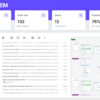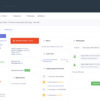Warren Buffett said,
“Only when the tide goes out do you discover who’s been swimming naked.”
In today’s rapidly evolving workplace, this metaphor describes the impact of AI on traditional business practices.
The Illusion of Busyness
For years, many companies have equated busyness with productivity. Packed calendars, overflowing inboxes, and back-to-back meetings were seen as indicators of a dedicated workforce. However, this perception is being challenged.
As AI continues to automate repetitive and mindless tasks, the “tide” of busy work recedes. This shift exposes the true value individuals bring to their organizations. Those who relied on appearing busy without delivering meaningful results may find themselves unprepared in this new landscape.
AI: The Great Revealer
AI is more than just a tool; it’s a catalyst for transparency. As routine tasks become automated, the emphasis shifts to the unique value individuals bring to their roles. This transition prompts a critical question: Without the veil of busywork, what genuine contributions remain?
Consider your daily operations stripped of repetitive tasks. What core value do you provide? For some, this introspection may be unsettling, but it’s essential for growth and adaptation.
Redefining Value
True value in the modern workplace stems from creativity, strategic thinking, and effective problem-solving, not simply hours logged or tasks completed. Efficiency should be measured by outcomes and impact, not by the volume of activity.
There’s no gold star for taking five hours to accomplish a task that could be completed in one. Embracing tools that enhance efficiency is not a sign of laziness but of effective execution!
The Cost of Inaction
Organizations that cling to outdated metrics and resist technological integration risk obsolescence. The tide of AI is receding, and it’s revealing the inefficiencies and redundancies that have long been masked by tradition.
Embracing the Future
The path forward involves leveraging AI to handle routine tasks, and freeing humans to do things only humans can do (for now)… for more strategic and creative problem solving. Just as calculators revolutionized computation, AI stands to redefine cognitive tasks, enhancing decision-making and innovation.
Leaders must foster a culture that values adaptability, continuous learning, and the intelligent application of technology. By doing so, organizations can ensure they remain competitive and resilient in an ever-evolving landscape.
Conclusion
The AI revolution is not a distant prospect; it’s an ongoing reality reshaping the business world. As the tide of traditional work recedes, it’s critical to assess and realign our contributions to ensure we’re not left exposed.
Are you prepared to navigate this new era?
Schedule a consultation with us to explore how AI can be strategically integrated into your operations.

















